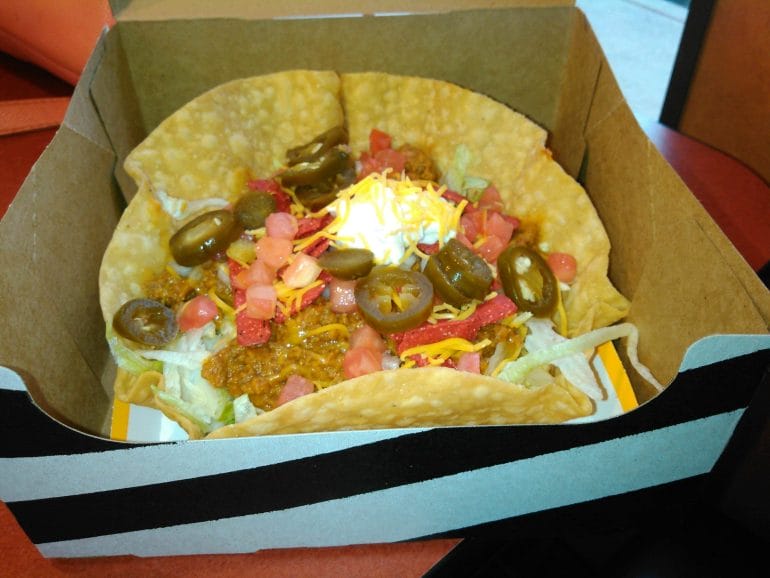Taco Bell has been under scrutiny for having a cancer warning due to the presence of acrylamide in their food items. Acrylamide is a chemical compound that forms naturally when certain foods are cooked at high temperatures. It is known to be a potential carcinogen, which means it may increase the risk of cancer if consumed in high amounts over a long period. As a result, Taco Bell, like other food establishments, is required to display a warning about this chemical for transparency and consumer awareness.

Understanding the Cancer Warning at Taco Bell: What You Need to Know
Taco Bell, the popular fast food chain known for its Mexican-inspired cuisine, has recently come under scrutiny due to a cancer warning that is displayed in their California restaurants. This warning, which is required by the state’s Proposition 65 law, has raised concerns among customers and prompted questions about the safety of their food.
What is Proposition 65?
Proposition 65, also known as the Safe Drinking Water and Toxic Enforcement Act, was passed in California in 1986. The purpose of this law is to protect the state’s residents from exposure to chemicals that are known to cause cancer, birth defects, or reproductive harm. Under Proposition 65, businesses are required to provide warnings to consumers if their products or establishments contain any of these listed chemicals in amounts that exceed the established thresholds.
Why is Taco Bell Displaying a Cancer Warning?
Taco Bell, like many other restaurants and food establishments in California, is required to display a cancer warning due to the presence of acrylamide in some of their menu items. Acrylamide is a chemical that forms naturally during certain cooking processes, particularly those involving high heat. It is commonly found in foods such as french fries, potato chips, and toasted bread.
Acrylamide is classified as a possible human carcinogen by the International Agency for Research on Cancer (IARC), a specialized agency of the World Health Organization. Studies conducted on animals have shown that exposure to high levels of acrylamide can lead to an increased risk of developing cancer. However, the exact health risks for humans are still uncertain.
Which Taco Bell Menu Items Are Affected?
The cancer warning at Taco Bell specifically applies to menu items that may contain acrylamide. These items include:
- French Fries
- Potato Chips
- Toasted Cheddar Chalupa
- Hash Browns
- Cinnamon Twists
It is important to note that not all Taco Bell menu items are affected by the cancer warning. Taco Bell has taken steps to minimize acrylamide levels in their food by adjusting cooking methods and ingredient formulations.
Should You Be Concerned?
While the presence of a cancer warning at Taco Bell may be alarming, it is important to understand that the warning is a precautionary measure required by California law. The risk of cancer from consuming acrylamide in food is still uncertain and highly dependent on the level and duration of exposure.
It is always advisable to practice moderation and eat a balanced diet that includes a variety of foods. If you are concerned about acrylamide exposure, you can choose to limit your consumption of foods that are known to contain higher levels of acrylamide, such as fried or toasted items.
In summary, Taco Bell displays a cancer warning in their California restaurants due to the presence of acrylamide in certain menu items. Acrylamide is a chemical that forms naturally during cooking processes and is classified as a possible human carcinogen. While the exact health risks for humans are uncertain, Taco Bell has taken steps to minimize acrylamide levels in their food. It is important to maintain a balanced diet and practice moderation when consuming foods that may contain acrylamide.

Taco Bell Food and Health: Unveiling the Cancer Risk Controversy
When it comes to fast food, Taco Bell is undoubtedly one of the top choices for many people. With its wide array of delicious tacos, burritos, and quesadillas, it’s hard to resist the temptation. However, in recent years, there has been a growing concern about the potential health risks associated with consuming Taco Bell’s food. In particular, a controversial claim linking Taco Bell and cancer has been circulating, leaving many customers worried and uncertain.
The Allegations:
Let’s get straight to the point. The claim suggests that Taco Bell’s food contains harmful chemicals that may increase the risk of cancer. Specifically, it points to the presence of a chemical called monosodium glutamate (MSG) and various artificial food additives. According to the allegations, these substances can be carcinogenic if consumed regularly and in large quantities.
The Truth Behind MSG:
MSG is a flavor enhancer commonly used in the food industry to improve taste. It’s important to note that numerous scientific studies have shown no direct link between MSG and cancer. The U.S. Food and Drug Administration (FDA) has classified MSG as safe for consumption when used within the approved limits. In fact, MSG occurs naturally in some foods, such as tomatoes and cheese.
Artificial Food Additives:
Taco Bell, like many other fast food chains, uses various artificial food additives to enhance flavors, extend shelf life, and improve texture. While it is true that some artificial additives have been associated with health concerns, such as allergic reactions or intolerance in certain individuals, there is currently no conclusive evidence linking them directly to cancer.
Taco Bell’s Commitment to Health:
Taco Bell understands the importance of health and nutrition, and they have taken steps to address the concerns of their customers. In recent years, Taco Bell has made significant changes to their menu, introducing more nutritious options and reducing the use of artificial additives.
They have eliminated artificial flavors and colors from many of their menu items, opting for more natural ingredients instead. They have also made efforts to increase transparency by providing detailed nutritional information on their website and in-store.
Importance of Moderation:
It’s essential to remember that no single food item or restaurant can be solely responsible for causing cancer. Maintaining a healthy lifestyle involves a balanced diet and regular exercise. While it’s okay to indulge in your favorite Taco Bell meal from time to time, moderation is the key to maintaining overall health.
In Summary:
The controversy surrounding Taco Bell and its alleged cancer risk is, in large part, based on misinformation and exaggeration. Scientific evidence does not support the claim that Taco Bell’s food poses a significant cancer risk. However, it’s always a good idea to be mindful of your overall nutrition and make informed choices when it comes to your diet.
Taco Bell continues to evolve its menu to cater to the changing preferences and demands of its customers, prioritizing health and offering a range of options to suit different dietary needs. So, next time you crave some Tex-Mex flavors, feel confident in enjoying your favorite Taco Bell meal without fear of compromising your health.

Cancer-Causing Ingredients in Taco Bell Products: Debunking the Rumors
Taco Bell, the popular fast-food chain known for its tasty Mexican-inspired cuisine, has been at the center of some controversy regarding the alleged presence of cancer-causing ingredients in their products. In this section, we will explore these claims and separate fact from fiction, providing you with accurate information to make informed decisions about your food choices.
The Rumor Mill
There have been persistent rumors circulating on social media and other platforms, claiming that Taco Bell uses ingredients that are linked to cancer. These rumors often mention specific additives or chemicals, aiming to create fear and mistrust among consumers. However, it is essential to approach these claims with skepticism and examine them critically.
The Truth about Taco Bell’s Ingredients
Taco Bell takes food safety and quality seriously. They have a commitment to providing customers with safe, delicious, and affordable food options. To ensure this, Taco Bell follows strict regulations and standards set by governmental bodies, such as the Food and Drug Administration (FDA) and the United States Department of Agriculture (USDA).
Taco Bell clearly lists all the ingredients used in their products on their website and in their restaurants. These ingredients go through rigorous testing and evaluation to ensure they meet the highest safety standards. Taco Bell also maintains transparency by regularly updating their ingredient list to reflect any changes.
Addressing Specific Claims
Let’s address some of the specific claims made about cancer-causing ingredients in Taco Bell products:
- Monosodium Glutamate (MSG): This flavor enhancer has been the subject of much debate. However, numerous scientific studies have found no conclusive evidence linking MSG to cancer. The FDA recognizes MSG as safe for consumption when used within the recommended limits. Taco Bell uses MSG in some of their products but ensures it is used responsibly.
- Sodium Nitrite: Sodium nitrite is commonly used as a preservative in processed meats. While there have been concerns about its potential to form nitrosamines, which are carcinogenic, the FDA regulates the use of sodium nitrite in food products. Taco Bell complies with these regulations to ensure the safety of their products.
- Artificial Food Coloring: Some artificial food colorings have been associated with cancer in animal studies. However, the FDA strictly regulates the use of food colorings in the food industry, and Taco Bell adheres to these regulations. In recent years, Taco Bell has made efforts to remove artificial food coloring from their ingredients.
- Preservatives: Taco Bell, like many other fast-food chains, uses preservatives to maintain the freshness and quality of their products. These preservatives go through rigorous testing and are deemed safe for consumption by regulatory authorities.
In Summary
It is important to separate fact from fiction when it comes to rumors about cancer-causing ingredients in Taco Bell products. Taco Bell takes food safety seriously and adheres to strict regulations set by governmental bodies. The claims made about specific ingredients like MSG, sodium nitrite, artificial food colorings, and preservatives are not substantiated by scientific evidence and are regulated within safe limits.
When enjoying your favorite Taco Bell meal, you can do so with confidence, knowing that Taco Bell places a high priority on your health and well-being.
Taco Bell’s Response to Cancer Warning Concerns: Safety Measures and Transparency
In recent years, there have been growing concerns regarding the potential health risks associated with certain food products. Taco Bell, a popular fast food chain known for its Mexican-inspired menu, has not been immune to such concerns. However, the company has taken proactive steps to address these concerns and ensure the safety of its customers.
Safety Measures Implemented by Taco Bell
Taco Bell recognizes the importance of food safety and has implemented several measures to ensure the quality and safety of its products. Here are some of the key safety measures undertaken by the company:
- Stringent Quality Control: Taco Bell has established rigorous quality control protocols to ensure that all ingredients used in their menu items meet the highest standards of safety and freshness. This includes thorough inspections of suppliers, as well as regular testing of ingredients for contaminants.
- Safe Food Handling Practices: The company has implemented strict food handling practices across all its restaurants, including proper storage, cooking, and serving techniques. Employees undergo regular training to maintain these standards and ensure the safe preparation of food.
- Enhanced Sanitation Procedures: Taco Bell maintains a strong focus on cleanliness and sanitation in its restaurants. Regular cleaning and sanitization of kitchen equipment, surfaces, and utensils are carried out to prevent cross-contamination and ensure a hygienic environment.
- Supplier Audits: Taco Bell conducts regular audits of its suppliers to ensure they adhere to food safety standards. This includes evaluating their facilities, processes, and quality control measures.
- Strict Compliance with Regulations: The company closely follows all relevant food safety regulations set by local health authorities and government agencies. This ensures that Taco Bell is in full compliance with the necessary safety guidelines.
Transparency and Consumer Communication
Aside from implementing safety measures, Taco Bell also prioritizes transparency and open communication with its customers. The company understands the importance of providing accurate and easily accessible information regarding its menu items. Here’s how Taco Bell achieves this:
- Online Menu Information: Taco Bell provides detailed information about its menu items, including ingredients and nutritional content, on its official website. Customers can easily access this information to make informed choices about their food selection.
- Allergen Awareness: The company acknowledges the significance of allergen concerns and provides allergen information for its menu items. This helps individuals with specific dietary needs to identify suitable options and avoid potential allergens.
- Customer Support: Taco Bell has a dedicated customer support team that is readily available to address any concerns or queries from customers. This ensures that customers can reach out to the company directly and receive timely responses.
- Transparency Initiatives: Taco Bell has initiated various transparency programs to further engage with customers. For instance, they have launched campaigns that showcase their commitment to sourcing high-quality ingredients and supporting sustainable practices.
- Public Statements: In response to specific concerns, Taco Bell has issued public statements addressing the issues directly. This demonstrates the company’s willingness to address concerns promptly and transparently.
In summary, Taco Bell takes the health and safety of its customers seriously. The company has implemented stringent safety measures throughout its operations, including quality control, food handling practices, sanitation procedures, supplier audits, and compliance with regulations. Furthermore, Taco Bell prioritizes transparency and consumer communication by providing detailed menu information, allergen awareness, accessible customer support, transparency initiatives, and issuing public statements. By taking these steps, Taco Bell demonstrates its commitment to ensuring the well-being of its customers and maintaining trust in its brand.
FAQs
Why does Taco Bell have a cancer warning?
Taco Bell has a cancer warning due to a chemical called acrylamide, which can be produced when certain foods, including fried and baked goods, are cooked at high temperatures. California law requires businesses to provide a warning if their products contain substances known to cause cancer or reproductive harm.
Conclusion:
In conclusion, the presence of a cancer warning at Taco Bell raises questions and concerns. While the exact reasons behind this warning may vary, it is important to remember that it is a regulatory requirement in some states to disclose potential risks associated with certain ingredients. Taco Bell, like any other fast food chain, utilizes a range of ingredients which may contain substances that could be linked to cancer. However, it is crucial to note that the cancer warning does not necessarily mean that consuming Taco Bell products will lead to cancer. It simply serves as a precautionary measure to inform consumers about potential risks.
As consumers, it is always wise to make informed choices about our food consumption. Enjoying Taco Bell or any other fast food in moderation, combined with a balanced and healthy lifestyle, can help mitigate any potential risks. Additionally, it is essential for Taco Bell and other fast food chains to prioritize the use of high-quality ingredients, conduct thorough testing, and continuously explore healthier alternatives to ensure the overall safety and well-being of their customers.
